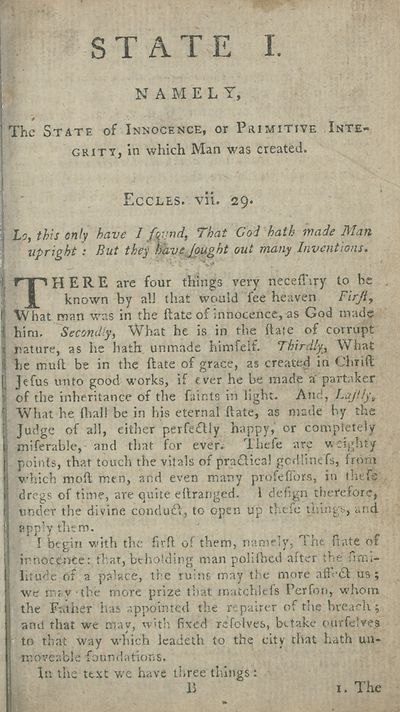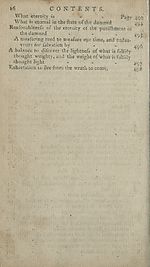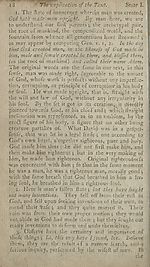Download files
Complete book:
Individual page:
Thumbnail gallery: Grid view | List view

STATE I.
NAMELY,
The State of Innocence, or Primitive Inte¬
grity, in which Man was created.
Eccles. vil. 29.
Lo, this only have I That God hath made Man
upright : But they haveJought out many Inventions.
THERE are four things very necefTiry to be
known by all that would lee heaven Firjl,
I I What man was in the ftate of innocence, as God made
him. Secondly, What he is in the ftate of corrupt
nature, as he hath unmade himfelf. Thirdly, What
he muft be in the ftate of grace, as created in C'hrift
Jefus unto good works, if ever he be made a partaker
of the inheritance of the faints in light. And, La/Uy,
What he (laall be in his eternal ftate, as made by the
Judge of all, either perfefUy happy, or completely
miferable, and that for ever. Thefe are weighty
points, that touch the vitals of praftica! gcdlinefs, from
which moll men, and even many profefibrs, in thefe
dregs of time, are quite eftranged. 1 defign therefore,
under the divine comiudl, to open up thefe things, and
i apply them.
I begin wdth the fnft of them, namely, The ftate of
innocence: that, beholding man polifhed after the lirni-
litude of a palace, the ruins may the more afFe£l us;
we mav the more prize that matchlefs Perfon, whom
the Father has appointed the repairer of the breach;
anil that we may, with lived refolves, betake ourfelves
to that way which leadeth to the city that hath un-
moveable foundations.
In the text we have three tilings:
1. The
NAMELY,
The State of Innocence, or Primitive Inte¬
grity, in which Man was created.
Eccles. vil. 29.
Lo, this only have I That God hath made Man
upright : But they haveJought out many Inventions.
THERE are four things very necefTiry to be
known by all that would lee heaven Firjl,
I I What man was in the ftate of innocence, as God made
him. Secondly, What he is in the ftate of corrupt
nature, as he hath unmade himfelf. Thirdly, What
he muft be in the ftate of grace, as created in C'hrift
Jefus unto good works, if ever he be made a partaker
of the inheritance of the faints in light. And, La/Uy,
What he (laall be in his eternal ftate, as made by the
Judge of all, either perfefUy happy, or completely
miferable, and that for ever. Thefe are weighty
points, that touch the vitals of praftica! gcdlinefs, from
which moll men, and even many profefibrs, in thefe
dregs of time, are quite eftranged. 1 defign therefore,
under the divine comiudl, to open up thefe things, and
i apply them.
I begin wdth the fnft of them, namely, The ftate of
innocence: that, beholding man polifhed after the lirni-
litude of a palace, the ruins may the more afFe£l us;
we mav the more prize that matchlefs Perfon, whom
the Father has appointed the repairer of the breach;
anil that we may, with lived refolves, betake ourfelves
to that way which leadeth to the city that hath un-
moveable foundations.
In the text we have three tilings:
1. The
Set display mode to:
![]() Universal Viewer |
Universal Viewer | ![]() Mirador |
Large image | Transcription
Mirador |
Large image | Transcription
| Antiquarian books of Scotland > Religion & morality > Human nature in its fourfold state > (21) |
|---|
| Permanent URL | https://digital.nls.uk/107541398 |
|---|
| Description | Thousands of printed books from the Antiquarian Books of Scotland collection which dates from 1641 to the 1980s. The collection consists of 14,800 books which were published in Scotland or have a Scottish connection, e.g. through the author, printer or owner. Subjects covered include sport, education, diseases, adventure, occupations, Jacobites, politics and religion. Among the 29 languages represented are English, Gaelic, Italian, French, Russian and Swedish. |
|---|

